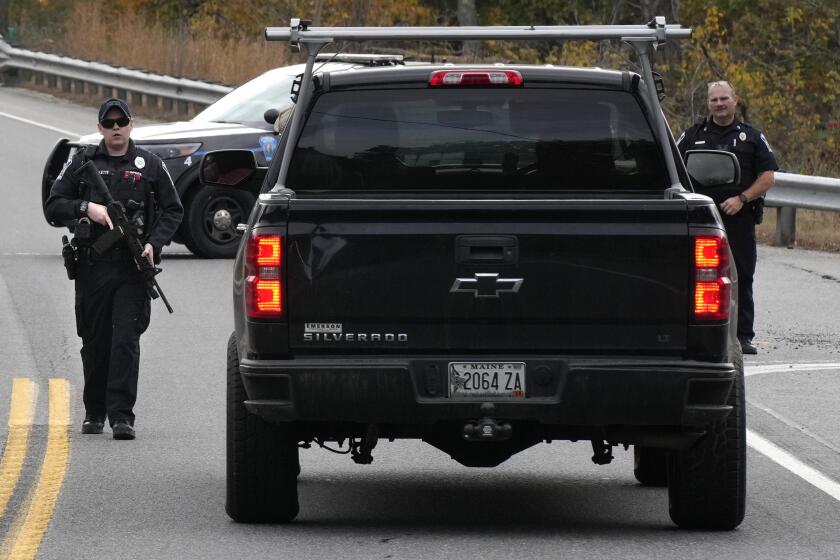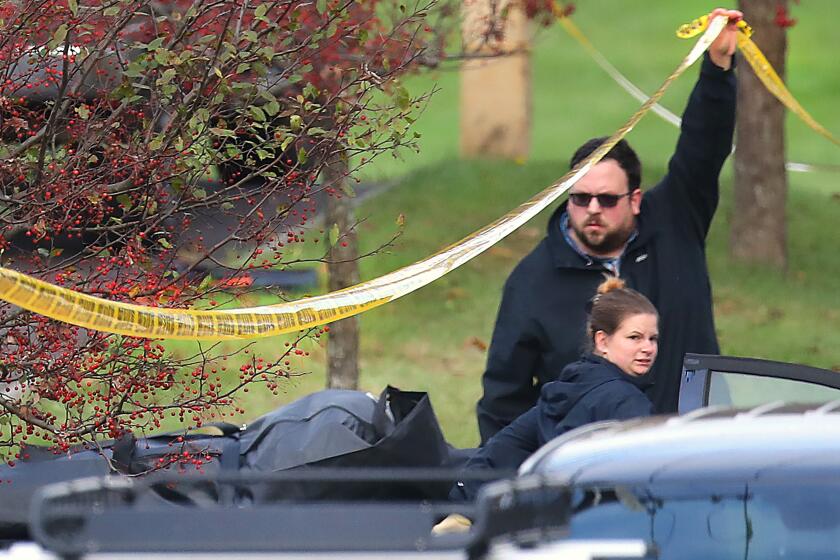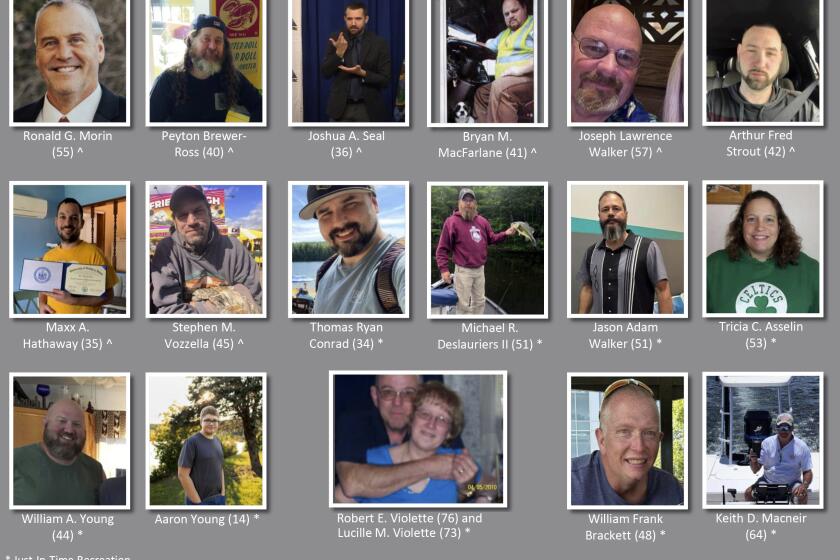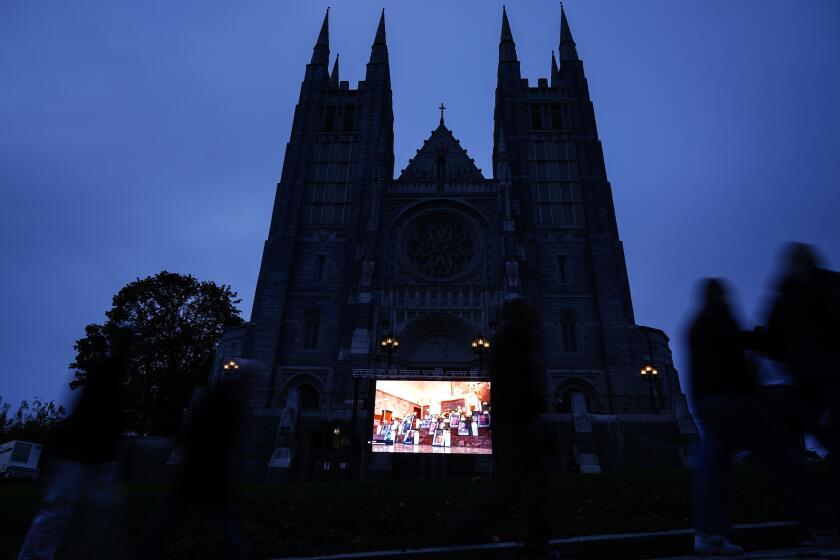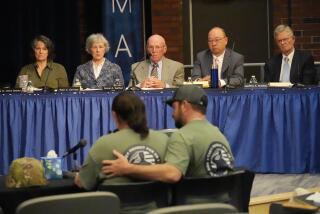Why was Maine shooter allowed to have guns? Questions swirl in wake of massacre
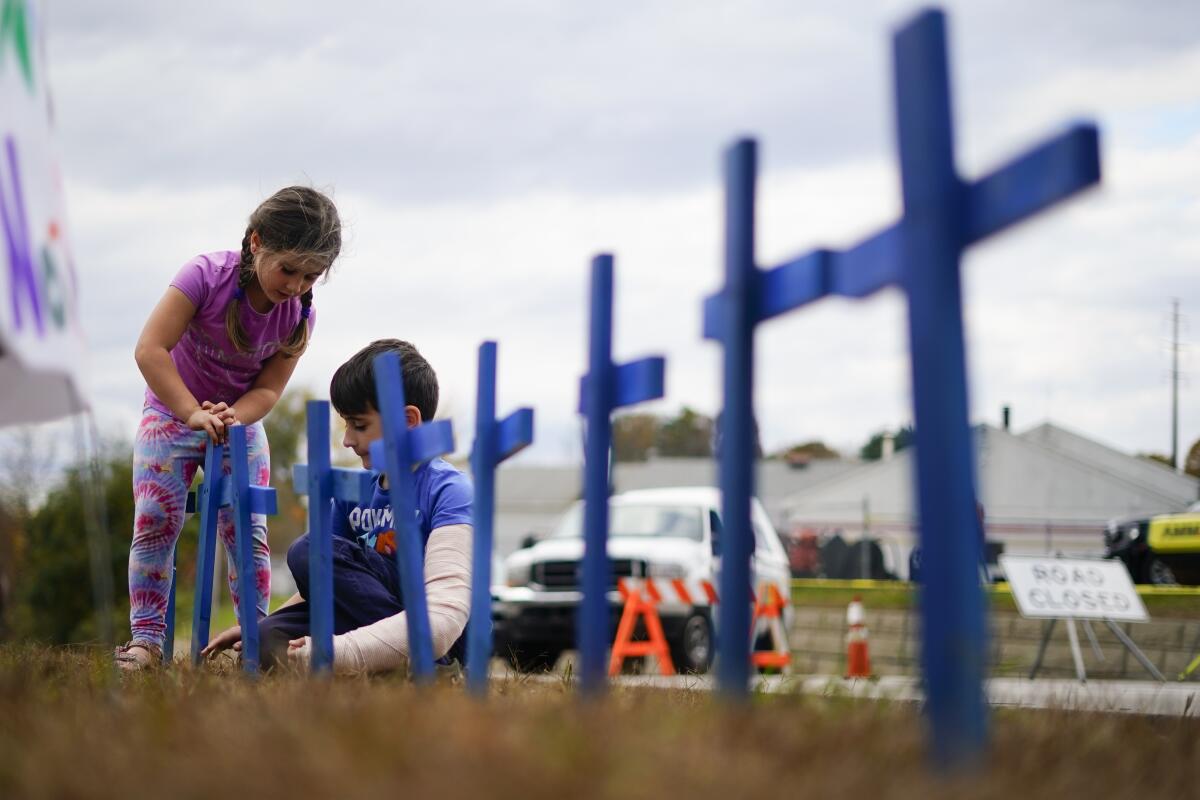
- Share via
LEWISTON, Maine — A history of mental illness. An array of weapons. Law enforcement knew about his potential for violence. But he was still able to own guns and commit the deadliest mass shooting in Maine’s history.
One week later, many in Lewiston and nationwide are asking: Why did he have guns at all?
Robert Card was identified by authorities as a person of interest four hours after he shot and killed 18 people and wounded 13 others at a bowling alley and a bar in Maine’s second-largest city. But Card, who was found dead two days after his rampage, had been well known to law enforcement for months.
The intensifying scrutiny over Card’s access to firearms underscores the difficulty in seizing guns from potentially dangerous people with mental illness — especially when numerous states and jurisdictions are involved, as was the case with Card.
The U.S. Army reservist spent time in a psychiatric facility in New York this summer and he reportedly blamed fellow military officials for his hospitalization, according to a letter an unidentified member of the unit wrote to a Maine sheriff’s deputy.
It’s unclear when the letter was sent, but the writer describes getting a call from a friend of Card’s who was concerned Card was “going to snap and commit a mass shooting.” The letter was included in the deputy’s Sept. 15 report about efforts to contact Card.
Authorities say 18 people were killed and 13 injured at two locations Wednesday night in Lewiston, the second-largest city in Maine.
Card threatened to shoot up the Army reserve drill center in Saco, Maine, and other places, and said that he was going to get “them.”
“Since the commander and I are the ones who had him committed we are the ‘them,’” wrote the unidentified letter writer. “He also said I was the reason he can’t buy guns anymore because of the commitment.”
Authorities at the state and federal level have not said that Card’s history of mental illness should have triggered laws that kept him from owning guns. There was nothing on Card’s record before the shooting that would have kept him from passing a federal background check to buy a gun, the Bureau of Alcohol, Tobacco, Firearms and Explosives said in a statement.
Involuntary commitments are reported to federal authorities differently from state to state, said Mark Collins, federal policy director at the gun-violence prevention group Brady.
Generally, though, not everyone who gets mental health treatment at a facility is considered involuntarily committed. That’s a determination legally made by a court or a board, which then communicates it to another state body tasked with sending that information to the federal background-check system maintained by the FBI.
Each state has an agency that should report it, but it’s not legally required everywhere, he said. Maine, for example, does require the State Bureau of Identification to report commitments to the FBI database.
At least four of the victims of a mass shooting in Maine were deaf, sending shock waves through the community.
“This is the clearest cut case I’ve seen where an extreme-risk protection order could have saved all these lives,” Collins said, referring to measures often called “red-flag” laws, which Maine does not have. “This guy did everything short of taking out a front-page ad in the newspaper saying he was going to commit an atrocity.”
Concern about Card’s behavior accelerated after an altercation he had with fellow Army Reserve members. Card and other members of the Army Reserve’s 3rd Battalion, 304th Infantry Unit were in New York for training on July 15 when he accused several of them of calling him a pedophile, shoved one of them and locked himself in his motel room. The next morning, he told another soldier that he wanted people to stop talking about him.
“I told him no one was talking about him and everyone here was his friend. Card told me to leave him alone and tried to slam the door in my face,” the soldier later told Maine authorities, according to documents released by the sheriff’s office.
New York State Police responded and brought Card to a hospital at the U.S. Military Academy in West Point for an evaluation. Card spent 14 days at the Four Winds Psychiatric Hospital in Katonah, N.Y., which is a few miles from West Point.
Jonathan Crisp, an Army lawyer for two decades before starting a criminal defense practice, said when soldiers are committed involuntarily to mental health facilities by others in the chain of command, it is a “reportable” event under Army regulations that triggers a requirement to alert others, including the FBI.
Police have not declared a motive in the mass shooting by Robert Card, whose body was discovered Friday.
“If they took him and he didn’t want to go and he refused to be admitted, it’s a slam dunk,” Crisp said. “This should have been reported.”
Questions over military protocols that should have been enacted with Card are similar to those raised in 2017 mass shooting during Sunday services at a church in Sutherland Springs, Texas. More than two dozen people — including eight children — were shot and killed by a gunman who had served in the Air Force before the attack and had once escaped a mental health center.
After Card left the psychiatric facility in early August, the Army directed that while on duty, he shouldn’t be allowed to have a weapon, handle ammunition or participate in live-fire activity. It also declared him to be non-deployable.
Military experts say that even if Card’s commanders determined he shouldn’t be around weapons after being committed, they would have had only a handful of options to implement, such as prohibiting him from handling weapons while on duty or attempting to sever him from the Army Reserves. There’s little they can do when the citizen-soldiers are back in civilian life.
Several weeks after his release from the hospital, on Sept. 15, a deputy was sent to visit Card’s home in Bowdoin, about 10 miles southeast of Lewiston, for a wellness check. A deputy went to Card’s trailer but couldn’t find him.
Maine’s authorities are trying to piece together the events that led to the worst mass shooting in the state’s history.
The sheriff’s office then sent out a statewide alert seeking help locating Card. It included a warning that he was known to be “armed and dangerous” and that officers should use extreme caution.
On Sept. 16, the same deputy and another one returned to Card’s trailer. Card’s car was there and the deputy said he could hear him moving around the trailer, but no one answered the door, according to the deputy’s report.
Deputies didn’t have legal authority to press the case if Card didn’t want to open the door, Sagadahoc County Sheriff Joel Merry said Wednesday .
On Oct. 18, the sheriff’s office canceled a statewide alert seeking help locating Card.
A week later, shortly before 7 p.m. on Oct. 25, authorities began receiving 911 calls about a gunman at the Just-In-Time Recreation bowling alley in Lewiston.
Associated Press writers David Sharp, Jake Bleiberg, Robert F. Bukaty, David R. Martin, Matt Rourke, Patrick Whittle and Michael Casey contributed to this report.
More to Read
Sign up for Essential California
The most important California stories and recommendations in your inbox every morning.
You may occasionally receive promotional content from the Los Angeles Times.
